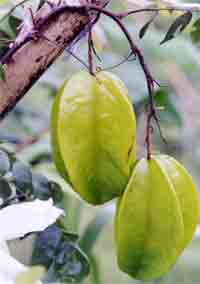‖n. sing. & pl. [ Sp. ] A kind of missile weapon consisting of one, two, or more balls of stone, iron, or other material, attached to the ends of a leather cord; -- used by the Gauchos of South America, and others, for hurling at and entangling an animal. [ 1913 Webster ]
‖n. pl. [ NL. ] (Zool.) A group of insects which do not undergo any metamorphosis.
a. [ See Bole clay. ] Of or pertaining to bole or clay; partaking of the nature and qualities of bole; clayey. [ 1913 Webster ]
n. (Bot.) An East Indian tree (Averrhoa Carambola), and its acid, juicy fruit; called also
‖n. pl. [ NL., fr. Gr.
(Med.) n. an exceptionally virulent hemorrhaic virus with a high mortality rate, first recognized in an outbreak on the
‖n. pl. [ NL. See Hemi-, and Metabola. ] (Zool.) Those insects which have an incomplete metamorphosis. [ 1913 Webster ]
‖n. pl. [ NL. See Holo-, and Metabola. ] (Zool.) Those insects which have a complete metamorphosis; metabola. [ 1913 Webster ]
n. [ Gr.
‖n. [ Cf. Pg. jambolão a kind of tropical fruit. ] (Bot.) A myrtaceous tree of the West Indies and tropical America (Calyptranthes Jambolana), with astringent bark, used for dyeing. It bears an edible fruit. [ 1913 Webster ]
a. [ See Obolus. ] Possessing only small coins; impoverished. [ R. ] Lamb. [ 1913 Webster ]
n.;
n. (Geom.) One branch of a parabola, being terminated at the principal vertex of the curve. [ 1913 Webster ]
It may pass current . . . for a triobolar ballad. Cheyne. [ 1913 Webster ]
‖n. pl. [ NL. ] (Zool.) A group of insects which do not undergo any metamorphosis.
a. [ See Bole clay. ] Of or pertaining to bole or clay; partaking of the nature and qualities of bole; clayey. [ 1913 Webster ]
‖n. sing. & pl. [ Sp. ] A kind of missile weapon consisting of one, two, or more balls of stone, iron, or other material, attached to the ends of a leather cord; -- used by the Gauchos of South America, and others, for hurling at and entangling an animal. [ 1913 Webster ]
n. (Bot.) An East Indian tree (Averrhoa Carambola), and its acid, juicy fruit; called also
‖n. pl. [ NL., fr. Gr.
(Med.) n. an exceptionally virulent hemorrhaic virus with a high mortality rate, first recognized in an outbreak on the
‖n. pl. [ NL. See Hemi-, and Metabola. ] (Zool.) Those insects which have an incomplete metamorphosis. [ 1913 Webster ]
‖n. pl. [ NL. See Holo-, and Metabola. ] (Zool.) Those insects which have a complete metamorphosis; metabola. [ 1913 Webster ]
n. [ Gr.
‖n. [ Cf. Pg. jambolão a kind of tropical fruit. ] (Bot.) A myrtaceous tree of the West Indies and tropical America (Calyptranthes Jambolana), with astringent bark, used for dyeing. It bears an edible fruit. [ 1913 Webster ]
a. [ See Obolus. ] Possessing only small coins; impoverished. [ R. ] Lamb. [ 1913 Webster ]
n.;
n. (Geom.) One branch of a parabola, being terminated at the principal vertex of the curve. [ 1913 Webster ]
It may pass current . . . for a triobolar ballad. Cheyne. [ 1913 Webster ]
